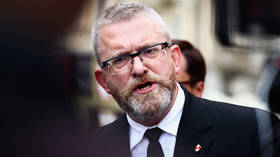BBC complains to Russia over leaked staff data that was ‘shared with authorities’
The BBC has gone out of its way to voice concern over the personal details of its staff in Russia appearing on social media and on a news site, not long after staying puzzlingly silent when UK media doxxed Sputnik staff in the UK.
A list featuring 44 names of BBC employees – with their pictures – published on a couple of Russian social media platforms and a news website did not sit well with the British broadcaster, which lamented “the groundless publication of our Moscow team’s details” and then requested that Russian authorities investigate the matter.
The #BBC has written to the Russian authorities to raise concerns about the apparent leak of personal information about its Moscow staff. Statement from @bbcworldservice Director Jamie Angus @grvlx001pic.twitter.com/cbqT4d8wcI
— BBC News Press Team (@BBCNewsPR) 29 декабря 2018 г.
The BBC said it was concerned with this “worrying” and “troubling” development and called it a “leak.” The statement seemed to implicate Russian officials, as the list contained information the broadcaster said it had “shared with the Russian authorities.” The Russian Foreign Ministry earlier said that the list seemed to contain open-source data.
Also on rt.com Names of BBC journalists in Russia made public after Sunday Times doxxed & shamed Sputnik staffOther British media were even less discreet as they spread conspiracy theories, linking the publication of the details to the Kremlin. The “leak … comes a week after Russia said it would launch an investigation into the BBC for violating fairness standards,” the Guardian said in its report, adding that “the information appears to have come from official documentation.”
The Daily Star went further and squarely called the publication a part of a “feud over Salisbury spy coverage” between Moscow and London – right in the headline.
They leak, we publish. They have oligarchs, we have entrepreneurs. They meddle, we promote democracy. And they started it. https://t.co/RXg0tMxkNu
— Max Blumenthal (@MaxBlumenthal) December 28, 2018
The media buzz around the “leaks,” while understandably concerning for the BBC, has at the same time revealed a glaring contradiction in relation to how the British media handled the doxxing of Sputnik news agency employees in the UK. Not stopping at publishing the journalists’ profiles, The Times newspaper outright called them “Kremlin stooges” in its article.
#Moscow doesn’t support, but understands the publication of Russian #BBC staff’s details – Peskov https://t.co/riFF1pcRJhpic.twitter.com/dQHrHVRrBP
— RT (@RT_com) 28 декабря 2018 г.
The story, which appeared days before the Russian BBC list, attempted to shame the journalists for merely working for the Russian media outlet. It even cited a Scottish MP who was calling on the British authorities to seize their assets.
Also on rt.com ‘Harassment that may put lives at risk’: British journalist slams the Times for doxing Sputnik staffFar from being outraged at the attempt to ostracize alternative media, UK papers seemed to only have gotten really interested in the Sputnik doxxing in the context of Moscow’s perceived “retaliation” to what, some implied, was British media regulator Ofcom targeting RT. No calls to investigate the naming and shaming of Sputnik employees ever followed.
This is what escalation looks like. I wasn't even aware that The Sunday Times had published the photos of journalists working for Sputnik UK. Why the bloody hell did they do that? Rupert Murdoch and his minions strike again.
— M. A. E. (@MElmaazi) December 27, 2018
A paper historically linked to UK security services runs interference for the Integrity Initiative - a covert British military-intelligence front - by publishing personal information of Sputnik journalists who covered it. You read English & still think that’s normal “publishing.”
— Max Blumenthal (@MaxBlumenthal) December 29, 2018
As of Saturday, the Russian Foreign Ministry hadn’t received any official complaints from the BBC regarding the situation, the ministry’s spokesperson Maria Zakharova said.
“BBC correspondents in Moscow regularly write or call me when they need something. This time around, no one called for several days,” she wrote on Facebook.
Subscribe to RT newsletter to get stories the mainstream media won’t tell you.














